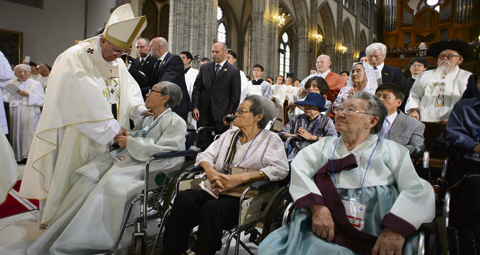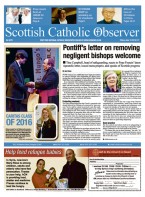January 16 | ![]() 0 COMMENTS
0 COMMENTS ![]() print
print

When did I see you in prison?
IAN DUNN explores the Knights of St Columba prayer campaign’s January theme of slavery and bondage, and looks at prayer intentions
The Knights of St Columba prayer campaign, launched on December 28, calls the Faithful to prayer and ask us all to specifically focus this month, dedicated to World Day of Peace, on all people who find themselves modern day slaves, often suffering physical and sexual abused.
Pope Francis used his World Day of Peace message this year to urge people of all religions and cultures to unite against modern slavery and human trafficking, celebrating in his first Mass at St Peter’s Basilica of 2015 that everyone has a God-given right to be free. The theme was No Longer Slaves, but Brothers and Sisters.
“All of us are called [by God] to be free, all are called to be sons and daughters, and each, according to his or her own responsibilities, is called to combat modern forms of enslavement. From every people, culture and religion, let us join our forces,” the Holy Father said. He also appealed to consumers to shun low-cost goods that may be the product of forced labour or other forms of exploitation in a message sent to heads of state and governments, international institutions and parishes throughout the 1.2-billion-member Church.
Slavery today
The second global slavery index released in November by the Walk Free Foundation, an Australian-based human rights group, estimated that almost 36 million people were living as slaves, trafficked into brothels, forced into manual labour, victims of debt bondage or born into servitude.
It is an unpleasant truth that slavery did not end with abolition in the 19th century. The practice still continues today in one form or another in every country in the world. From women forced into prostitution, children and adults forced to work in agriculture, domestic work, or factories and sweatshops producing goods for global supply chains, entire families forced to work for nothing to pay off generational debts; or girls forced to marry older men, the illegal practice still blights contemporary world.
According to the International Labour Organisation (ILO) around 21 million men, women and children around the world are in a form of slavery.
There are many different characteristics that distinguish slavery from other human rights violations, however only one needs to be present for slavery to exist. Someone is in slavery if they are forced to work—through mental or physical threat; owned or controlled by an ‘employer,’ usually through mental or physical abuse or the threat of abuse; dehumanised, treated as a commodity or bought and sold as ‘property’ or physically constrained or have restrictions placed on his/her freedom of movement.
Contemporary slavery takes various forms and affects people of all ages, gender and races.
Pope Francis
Pope Francis has made ending modern slavery a key mark of his Papacy. He joined 12 other world faith leaders in a ground-breaking initiative ‘to eradicate modern slavery’ by 2020 last month at the Vatican.
The Pope, with the Archbishop of Canterbury, Ecumenical Patriarch Bartholomew from Greece and senior representatives of the Jewish, Muslim, Hindu and Buddhist faiths, gathered at the Vatican to adopt the Joint Declaration Against Modern Slavery.
The declaration stated: “Modern slavery, in terms of human trafficking, forced labour and prostitution, organ trafficking, and any relationship that fails to respect the fundamental conviction that all people are equal and have the same freedom and dignity, is a crime against humanity.”
The declaration on the World Day for Abolition of Slavery was organised by the Global Freedom Network, which was launched at the Vatican in March.
Pope Francis opened the conference with a very strongly worded condemnation of human trafficking as a crime against humanity. He said that everyone is born with the same dignity and freedom, and that anything that hurts this is an abhorrent crime against humanity. Everyone is called to action, he said; we must deplore everything depriving people of their God-given dignity.
Increased efforts
The Bishops of England and Wales have taken the lead on this issue organising a number of conferences of representatives of national and international police agencies, women and men religious and humanitarian workers aiding victims.
At one conference at the Vatican in April last year, awoman from Hungary told attendees how her own sister had sold her into slavery. She was separated from her 2-year-old daughter and was even ‘traded for a car’ by her traffickers. She was abused, beaten and bullied by the family housing her, including the family’s 3-year-old son, she said. She was forced to prostitute herself ‘24 hours a day,’ seven days a week for three years.
The conference focused on showcasing a joint initiative between police and the Church that began in London three years ago; it’s a model the British bishops hope will be copied and adopted around the world.
Detective Inspector Kevin Hyland of Scotland Yard’s trafficking and organised crime unit explained in his talk April 9 how, when the police conduct raids on suspected brothels and potential crime scenes, they have group of nuns speak with the women found inside because the women often don’t want to talk to the police, but they do open up to the sisters.
The sisters pass on to police additional testimony they receive from the women while they are living under the sisters’ care.
Disclosures of rape and other crimes ‘led to immediate arrests’ and the identification of perpetrators as well as brought down a major trafficking ring, he said.
Prayer
As well as the front line work being done by the Church to help those on the front line of modern slavery, all Catholics can help by praying for those who are in bondage.
Luke’s Gospel from Thursday March 8 quotes Isaiah; “The Spirit of the Lord has been given to me, for he has anointed me. He has sent me to bring the good news to the poor, to proclaim liberty to captives and to the blind new sight, to set the downtrodden free.”
Let us all pray for the downtrodden to be set free as we enter 2015.
— The Knights of St Columba spiritual bouquet is a gift of prayer. The Catholic lay organisation started a journey of prayers, devotional acts or good deeds on December 28, 2014, the Feast of the Holy Family, and invites you to take part on this spiritual path over the next 10 months. Help to build a garland of between now and the Feast of St John Paul II, on October 22 this year. Submit your prayers and devotions in one of the following ways. Writing to: The Knights of St Columba, Head Office , 75 Hillington, Road South, Glasgow, G52 2AE or e-mail to [email protected] You can also contribute hrough the mational website at www.ksc.org.uk
— The SCO is media partner for the Knights of St Columba spiritual bouquet











